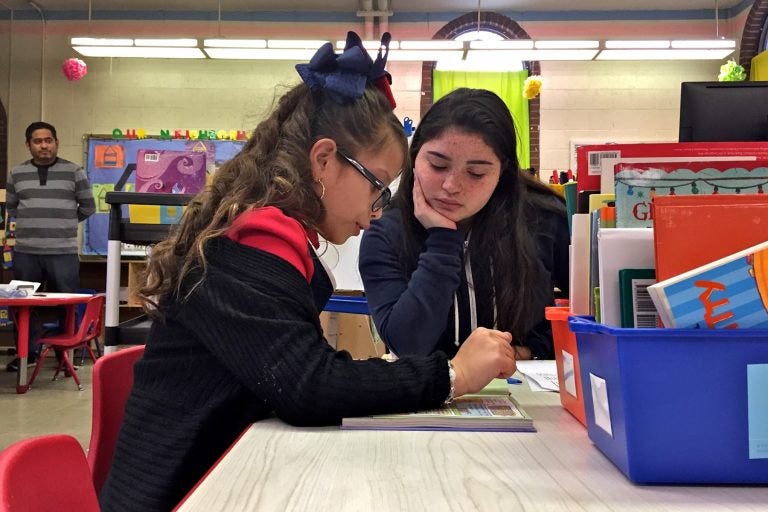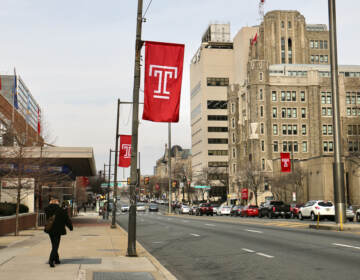As Philly kids learn to read, ‘coaches’ help them along
New program is part of a broader push by city officials to focus more attention and intention on what Philadelphia students do after school.

High school senior Shalia Alejandro (right) helps Soriely Quinonez, a student at Cramp Elementary School. (Avi Wolfman-Arent/WHYY)
Shalia Alejandro moved to Philadelphia from Puerto Rico when she was 6, just about the age kids are starting to read.
Unlike her peers, though, she was also trying to learn a new language and new customs. The swirl of unfamiliar things left her confused and lacking confidence.
“A lot of times, it was really discouraging seeing everyone speak English and you’re just off in the corner like, ‘OK, I need to find a way to be able relate to them,’ ” she said.
She broke through in second grade, under the tutelage of a teacher who would give students an hour or more simply to read and grow more comfortable with books.
Today, Alejandro is a confident high school senior at Marianna Braccetti Academy Charter School who plans to work in early childhood education some day. After school, she goes back to her alma mater, William Cramp School in North Philadelphia, and employs the same strategy her second-grade teacher used.
For one hour, she sits with Soriely Quinonez and they read. Sometimes Alejandro does the reading. Sometimes Soriely works through the text with Alejandro as her guide.
Soriely also moved to Philadelphia from Puerto Rico, and she sometimes suffers crises of confidence. When the two first started working together in January, Soriely would apologize when she didn’t know a word.
“It’s OK,” Alejandro would tell her. “We’re here to be able to grow.”
Over the past month, though, the apologies have started to fade, replaced by a burgeoning trust and friendship.
“It’s been cool to see her grow and become more comfortable with me,” Alejandro said.
‘A confidence booster’
It sounds simple — an hour of unstructured reading with a caring adult — but Philadelphia officials think it could unlock worlds of potential.
Alejandro is one of 112 “reading coaches” the city has trained and deployed since January. The program assigns trained volunteers to read one-on-one with kids in schools, libraries, and recreation centers across Philadelphia.
The program is part of a broader push by city officials to focus more attention and intention on what students do after school. The city wants to know what it’s getting for the $40 million it spends annually on out-of-school-time programming, and it wants that programming to provide kids with meaningful academic or health benefits.
The program does not, on the surface, seem like it fits that goal. It’s not explicitly academic or overly scripted.
“It’s not, we must read,” said volunteer Leslie Craigmyle. “It’s not forced.”
But it is serious. Volunteers keep logs that detail what each student reads and how well they’re progressing through those texts.
The program is based on an initiative out of Oregon that’s proved effective. Some of the model’s appeal comes from its simplicity. One-on-one reading time may not sound revolutionary, but it can be meaningful.
“It’s not always often that everybody has someone in their lives who just dedicates and gives their full attention to them,” said Cramp principal Deanda Logan.
Low-income kids are significantly less likely to be read to than their wealthier peers, and they’re significantly less likely to own 10 or more books. The reading coaches programs aims to tackle both of those deficits. Students in the initiative get to take home 25 new books.
The goal isn’t pedagogical as much as it is atmospheric. Organizers want kids in the program to get used to the idea of reading and being around books.
“This is not an actual tutoring program,” said David Guzman, the program’s site coordinator at William Cramp. “The volunteers are not teaching the students how to read. This is more of a confidence booster.”
There are currently 108 students enrolled in the reading coaches program. The city hopes eventually to grow that number to 800.
—
Disclosure: The William Penn Foundation provides funding for both the reading coaches program and WHYY’s education coverage.
WHYY is your source for fact-based, in-depth journalism and information. As a nonprofit organization, we rely on financial support from readers like you. Please give today.





